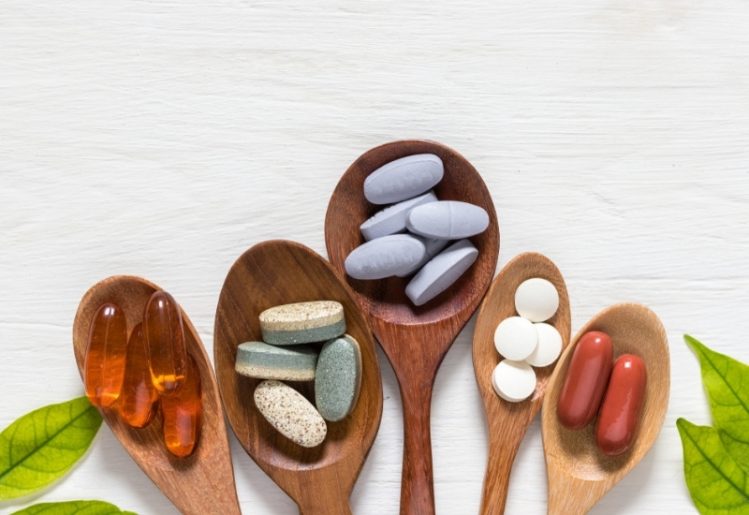Study Suggests Taking Supplements May Reduce COVID-19 Risk in Women
Even with the much-anticipated arrival of the COVID-19 vaccine, there is still a long way to go before we are out of the woods in battling this deadly virus. Fortunately, you are not powerless when it comes to protecting yourself from infection. In addition to following the recommended protocols and proper personal hygiene practices, wearing a mask and practicing social distancing, there are steps that you can take to further reduce your risk of contracting the virus. While there is still a lot be learned about the ongoing coronavirus pandemic, new research points to how taking supplements may reduce COVID-19 risk.
A new study suggests that being intentional about taking supplements and certain vitamins may lower your risk of becoming infected with COVID-19. The supplement melatonin has also been demonstrated to be particularly effective at enabling your immune system to better handle these new viruses. Here is what you need to know about this exciting emerging research and how you can apply it to your life today to protect yourself and your family.
How Taking Supplements May Reduce COVID-19 Risk
 A recent study by King’s College in London looked at data from 1.4 million participants through a COVID Symptom Study app to learn more about the role of supplements in reducing the risk of the COVID-19 virus. The participants of the study provided for review data regarding their regular use of various dietary supplements.
A recent study by King’s College in London looked at data from 1.4 million participants through a COVID Symptom Study app to learn more about the role of supplements in reducing the risk of the COVID-19 virus. The participants of the study provided for review data regarding their regular use of various dietary supplements.
What was most interesting about the data analysis is that only females seemed to experience a benefit from taking supplements. There were four specific supplements that stood out as being a significant deterrent, for women, to contracting the COVID-19 virus:
- Probiotics: Those who took probiotics exhibited a 14 percent reduced risk of contracting COVID-19.
- Multivitamins: Those who took a multivitamin showed a 13 percent reduced risk of contracting COVID-19.
- Omega-3 Fatty Acids: Omega-3 fatty acid supplementation appeared to result in a 12 percent reduced risk of contracting COVID-19.
- Vitamin D: Taking supplemental vitamin D was associated with a 9 percent reduced risk of contracting COVID-19.
In particular, vitamin D has received a great amount of attention throughout the pandemic as being an effective protective agent. Some studies suggest that being diligent about taking vitamin D may also reduce the risk of developing serious complications if you do test positive for the virus. This protective effect is largely attributed to the vitamin's ability to suppress cytokine production; one of the most severe complications associated with COVID-19.
Importance of Melatonin for a Healthy Immune System
While scientists have long understood the role that melatonin plays in regulating your sleep cycles, it has recently been revealed that this hormone can also help to support a healthy immune system. Clearly, you will be better equipped to avoid the severe effects of the virus if your immune system is working at optimal levels.
Melatonin is responsible for providing crucial antioxidants and anti-inflammatory effects to the body, boosting immune function as a result. Melatonin is produced throughout the body, including in the tissues of the gastrointestinal tract and in some immune cells.
Melatonin as an Immune Response Modulator
One of the primary ways that melatonin works is by acting as a modulator for the immune system. Scientists have discovered that the hormone can either boost immune response or suppress it, depending on the situation. This ability to discern when a full immune response should be activated or when it should be suppressed is especially important when the body encounters the COVID-19 virus.
Many individuals become severely ill when their immune system overreacts to the presence of the virus, triggering acute organ failure. Because melatonin can provide modulation of immune function, it may be a key weapon in helping the body to act appropriately in response to the virus.
How to Support Healthy Levels of These Important Nutrients
Now that you understand that taking supplements may reduce COVID-19 risk, how do you put this knowledge into practice? Here are the two primary ways that you can support healthy levels of these key nutrients so that you can put your body in the best position to fight the virus.
Diet
 The cornerstone of all good health starts with a commitment to eating a nutritious diet. The building blocks of your diet should be fresh fruits and vegetables, lean proteins, whole grains and foods that are rich in calcium. If putting your body in the position to handle exposure to COVID-19 is your goal, be sure to focus on getting adequate amounts of vitamins D, A, and C as well as probiotics, iron, zinc and omega-3 fatty acids.
The cornerstone of all good health starts with a commitment to eating a nutritious diet. The building blocks of your diet should be fresh fruits and vegetables, lean proteins, whole grains and foods that are rich in calcium. If putting your body in the position to handle exposure to COVID-19 is your goal, be sure to focus on getting adequate amounts of vitamins D, A, and C as well as probiotics, iron, zinc and omega-3 fatty acids.
Supplements
Despite your best efforts, it can be challenging to obtain all of your nutrients through food alone. Look at supplements as a form of insurance to ensure your body has all that it needs to function at optimal levels of health. Cultivating a vitamin and supplement routine that includes the best supplements for protecting against COVID-19 is a good idea during these uncertain times. In your routine, be sure to include a melatonin supplement.
Even when the COVID-19 virus is not the threat that it is today, the lessons that we have learned about taking care of the body through vitamins and supplements will stick. Being purposeful about taking care of your body now will deliver benefits as you work to avoid the novel coronavirus, as well as in the future.





